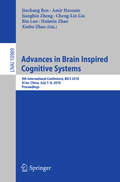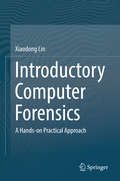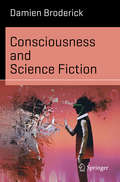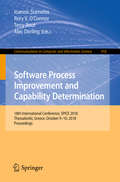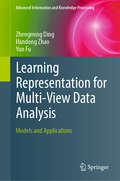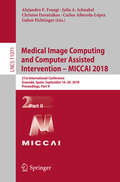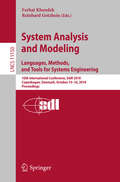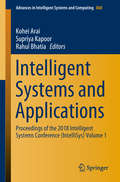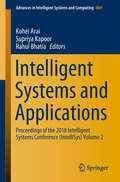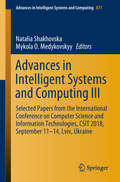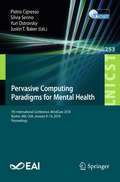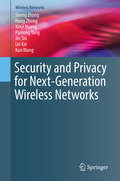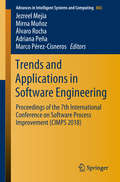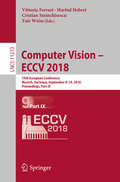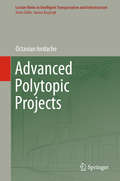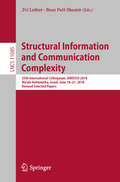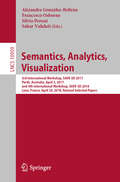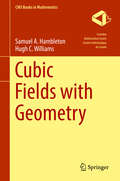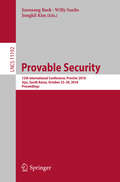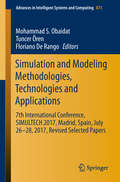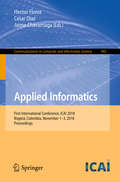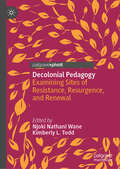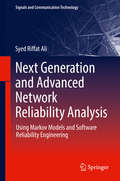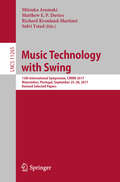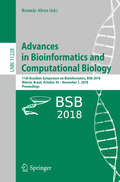- Table View
- List View
Advances in Brain Inspired Cognitive Systems: 5th International Conference, Bics 2012, Shenyang, Liaoning, China, July 11-14, 2012 Proceedings (Lecture Notes in Computer Science #7366)
by Amir Hussain Cheng-Lin Liu Bin Luo Huimin Zhao Jinchang Ren Jiangbin Zheng Xinbo ZhaoThis book constitutes the refereed proceedings of the 9th International Conference on Advances in Brain Inspired Cognitive Systems, BICS 2018, held in Xi’an, China, in July 2018. The 83 papers presented in this volume were carefully reviewed and selected from 137 submissions. The papers were organized in topical sections named: neural computation; biologically inspired systems; image recognition: detection, tracking and classification; data analysis and natural language processing; and applications.
Introductory Computer Forensics: A Hands-on Practical Approach
by Xiaodong LinThis textbook provides an introduction to digital forensics, a rapidly evolving field for solving crimes. Beginning with the basic concepts of computer forensics, each of the book’s 21 chapters focuses on a particular forensic topic composed of two parts: background knowledge and hands-on experience through practice exercises. Each theoretical or background section concludes with a series of review questions, which are prepared to test students’ understanding of the materials, while the practice exercises are intended to afford students the opportunity to apply the concepts introduced in the section on background knowledge. This experience-oriented textbook is meant to assist students in gaining a better understanding of digital forensics through hands-on practice in collecting and preserving digital evidence by completing various exercises. With 20 student-directed, inquiry-based practice exercises, students will better understand digital forensic concepts and learn digital forensic investigation techniques. This textbook is intended for upper undergraduate and graduate-level students who are taking digital-forensic related courses or working in digital forensics research. It can also be used by digital forensics practitioners, IT security analysts, and security engineers working in the IT security industry, particular IT professionals responsible for digital investigation and incident handling or researchers working in these related fields as a reference book.
Consciousness and Science Fiction (Science and Fiction)
by Damien BroderickScience fiction explores the wonderful, baffling and wildly entertaining aspects of a universe unimaginably old and vast, and with a future even more immense. It reaches into that endless cosmos with the tools of rational investigation and storytelling. At the core of both science and science fiction is the engaged human mind--a consciousness that sees and feels and thinks and loves. But what is this mind, this aware and self-aware consciousness that seems unlike anything else we experience? What makes consciousness the Hard Problem of philosophy, still unsolved after millennia of probing? This book looks into the heart of this mystery - at the science and philosophy of consciousness and at many inspiring fictional examples - and finds strange, challenging answers.The book's content and entertaining style will appeal equally to science fiction enthusiasts and scholars, including cognitive and neuroscientists, as well as philosophers of mind. It is a refreshing romp through the science and science fiction of consciousness.
Software Process Improvement and Capability Determination: 18th International Conference, SPICE 2018, Thessaloniki, Greece, October 9–10, 2018, Proceedings (Communications in Computer and Information Science #918)
by Ioannis Stamelos Rory V. O'Connor Terry Rout Alec DorlingThis volume constitutes the refereed proceedings of the 18th International Conference on Software Process Improvement and Capability Determination, SPICE 2018, held in Tessaloniki, Greece, in October 2018. The 26 full papers presented were carefully reviewed and selected from 40 submissions. The papers are organized in the following topical sections: SPI systematic literature reviews; SPI and assessment; SPI methods and reference models; SPI education and management issues; SPI knowledge and change processes; SPI compliance and configuration; SPI and agile; industry short papers.
Learning Representation for Multi-View Data Analysis: Models and Applications (Advanced Information and Knowledge Processing)
by Yun Fu Zhengming Ding Handong ZhaoThis book equips readers to handle complex multi-view data representation, centered around several major visual applications, sharing many tips and insights through a unified learning framework. This framework is able to model most existing multi-view learning and domain adaptation, enriching readers’ understanding from their similarity, and differences based on data organization and problem settings, as well as the research goal. A comprehensive review exhaustively provides the key recent research on multi-view data analysis, i.e., multi-view clustering, multi-view classification, zero-shot learning, and domain adaption. More practical challenges in multi-view data analysis are discussed including incomplete, unbalanced and large-scale multi-view learning. Learning Representation for Multi-View Data Analysis covers a wide range of applications in the research fields of big data, human-centered computing, pattern recognition, digital marketing, web mining, and computer vision.
Medical Image Computing and Computer Assisted Intervention – MICCAI 2018: 21st International Conference, Granada, Spain, September 16-20, 2018, Proceedings, Part II (Lecture Notes in Computer Science #11071)
by Alejandro F. Frangi Gabor Fichtinger Julia A. Schnabel Christos Davatzikos Carlos Alberola-LópezThe four-volume set LNCS 11070, 11071, 11072, and 11073 constitutes the refereed proceedings of the 21st International Conference on Medical Image Computing and Computer-Assisted Intervention, MICCAI 2018, held in Granada, Spain, in September 2018. The 373 revised full papers presented were carefully reviewed and selected from 1068 submissions in a double-blind review process. The papers have been organized in the following topical sections: Part I: Image Quality and Artefacts; Image Reconstruction Methods; Machine Learning in Medical Imaging; Statistical Analysis for Medical Imaging; Image Registration Methods. Part II: Optical and Histology Applications: Optical Imaging Applications; Histology Applications; Microscopy Applications; Optical Coherence Tomography and Other Optical Imaging Applications. Cardiac, Chest and Abdominal Applications: Cardiac Imaging Applications: Colorectal, Kidney and Liver Imaging Applications; Lung Imaging Applications; Breast Imaging Applications; Other Abdominal Applications. Part III: Diffusion Tensor Imaging and Functional MRI: Diffusion Tensor Imaging; Diffusion Weighted Imaging; Functional MRI; Human Connectome. Neuroimaging and Brain Segmentation Methods: Neuroimaging; Brain Segmentation Methods.Part IV: Computer Assisted Intervention: Image Guided Interventions and Surgery; Surgical Planning, Simulation and Work Flow Analysis; Visualization and Augmented Reality. Image Segmentation Methods: General Image Segmentation Methods, Measures and Applications; Multi-Organ Segmentation; Abdominal Segmentation Methods; Cardiac Segmentation Methods; Chest, Lung and Spine Segmentation; Other Segmentation Applications.
System Analysis and Modeling. Languages, Methods, and Tools for Systems Engineering: 10th International Conference, SAM 2018, Copenhagen, Denmark, October 15–16, 2018, Proceedings (Lecture Notes in Computer Science #11150)
by Ferhat Khendek Reinhard GotzheinThis book constitutes the refereed proceedings of the 10th International Conference on System Analysis and Modeling, SAM 2018, held in Copenhagen Denmark, in October 2018. The 12 full papers and 2 short papers presented were carefully reviewed and selected from 24 submissions. The papers describe innovations, trends, and experiences in modeling and analysis of complex systems using ITU-T's Specification and Description Language (SDL-2010) and Message Sequence Chart (MSC) notations, as well as related system design languages — including UML, ASN.1, TTCN, SysML and the User Requirements Notation (URN). This year’s edition of SAM will be under the theme “Languages, Methods, and Tools for Systems Engineering”, including languages and methods standardized by the ITU-T, and domain-specific languages. Also included are software engineering technologies, such as for requirements engineering, software verification and validation, and automated code generation.
Intelligent Systems and Applications: Proceedings of the 2018 Intelligent Systems Conference (IntelliSys) Volume 1 (Advances in Intelligent Systems and Computing #868)
by Kohei Arai Supriya Kapoor Rahul BhatiaGathering the Proceedings of the 2018 Intelligent Systems Conference (IntelliSys 2018), this book offers a remarkable collection of chapters covering a wide range of topics in intelligent systems and computing, and their real-world applications. The Conference attracted a total of 568 submissions from pioneering researchers, scientists, industrial engineers, and students from all around the world. These submissions underwent a double-blind peer review process, after which 194 (including 13 poster papers) were selected to be included in these proceedings. As intelligent systems continue to replace and sometimes outperform human intelligence in decision-making processes, they have made it possible to tackle many problems more effectively. This branching out of computational intelligence in several directions, and the use of intelligent systems in everyday applications, have created the need for such an international conference, which serves as a venue for reporting on cutting-edge innovations and developments. This book collects both theory and application-based chapters on all aspects of artificial intelligence, from classical to intelligent scope. Readers are sure to find the book both interesting and valuable, as it presents state-of-the-art intelligent methods and techniques for solving real-world problems, along with a vision of future research directions.
Intelligent Systems and Applications: Proceedings of the 2018 Intelligent Systems Conference (IntelliSys) Volume 2 (Advances in Intelligent Systems and Computing #869)
by Kohei Arai Supriya Kapoor Rahul BhatiaGathering the Proceedings of the 2018 Intelligent Systems Conference (IntelliSys 2018), this book offers a remarkable collection of chapters covering a wide range of topics in intelligent systems and computing, and their real-world applications. The Conference attracted a total of 568 submissions from pioneering researchers, scientists, industrial engineers, and students from all around the world. These submissions underwent a double-blind peer review process, after which 194 (including 13 poster papers) were selected to be included in these proceedings. As intelligent systems continue to replace and sometimes outperform human intelligence in decision-making processes, they have made it possible to tackle many problems more effectively. This branching out of computational intelligence in several directions, and the use of intelligent systems in everyday applications, have created the need for such an international conference, which serves as a venue for reporting on cutting-edge innovations and developments. This book collects both theory and application-based chapters on all aspects of artificial intelligence, from classical to intelligent scope. Readers are sure to find the book both interesting and valuable, as it presents state-of-the-art intelligent methods and techniques for solving real-world problems, along with a vision of future research directions.
Advances in Intelligent Systems and Computing III: Selected Papers from the International Conference on Computer Science and Information Technologies, CSIT 2018, September 11-14, Lviv, Ukraine (Advances in Intelligent Systems and Computing #871)
by Natalia Shakhovska Mykola O. MedykovskyyThis book reports on new theories and applications in the field of intelligent systems and computing. It covers computational and artificial intelligence methods, as well as advances in computer vision, current issues in big data and cloud computing, computation linguistics, and cyber-physical systems. It also reports on data mining and knowledge extraction technologies, as well as central issues in intelligent information management.Written by active researchers, the respective chapters are based on papers presented at the International Conference on Computer Science and Information Technologies (CSIT 2018), held on September 11–14, 2018, in Lviv, Ukraine, and jointly organized by the Lviv Polytechnic National University, Ukraine, the Kharkiv National University of Radio Electronics, Ukraine, and the Technical University of Lodz, Poland, under patronage of Ministry of Education and Science of Ukraine. Given its breadth of coverage, the book provides academics and professionals with extensive information and a timely snapshot of the field of intelligent systems, and is sure to foster new discussions and collaborations among different groups.
Pervasive Computing Paradigms for Mental Health: 7th International Conference, MindCare 2018, Boston, MA, USA, January 9–10, 2018, Proceedings (Lecture Notes of the Institute for Computer Sciences, Social Informatics and Telecommunications Engineering #253)
by Silvia Serino Pietro Cipresso Yuri Ostrovsky Justin T. BakerThis book constitutes the refereed proceedings of the 7th International Conference on Pervasive Computing Paradigms for Mental Health, MindCare 2018, held in Boston, MA, USA, Jin January 2018. The 19 papers presented were carefully reviewed and selected from 30 submissions and present advanced computing and communication technologies from the use of wearable sensors and ecological virtual environments to use of big data and machine learning techniques. These technologies can be used to support and promote the well-being through an objective continuous data collection and personalized
Security and Privacy for Next-Generation Wireless Networks (Wireless Networks)
by Lei Xie Xinyi Huang Sheng Zhong Kun Wang Hong Zhong Panlong Yang Jin ShiThis timely book provides broad coverage of security and privacy issues in the macro and micro perspective. In macroperspective, the system and algorithm fundamentals of next-generation wireless networks are discussed. In micro-perspective, this book focuses on the key secure and privacy techniques in different emerging networks from the interconnection view of human and cyber-physical world. This book includes 7 chapters from prominent international researchers working in this subject area. This book serves as a useful reference for researchers, graduate students, and practitioners seeking solutions to wireless security and privacy related issues Recent advances in wireless communication technologies have enabled the large-scale deployment of next-generation wireless networks, and many other wireless applications are emerging. The next generation of mobile networks continues to transform the way people communicate and access information. As a matter of fact, next-generation emerging networks are exploiting their numerous applications in both military and civil fields. For most applications, it is important to guarantee high security of the deployed network in order to defend against attacks from adversaries, as well as the privacy intrusion. The key target in the development of next-generation wireless networks is to promote the integration of the human, cyber, and physical worlds. Previous work in Cyber Physical Systems (CPS) considered the connection between the cyber world and the physical world. In the recent studies, human involvement brings new channels and initiatives in this interconnection. In this integration process, security and privacy are critical issues to many wireless network applications, and it is a paramount concern for the growth of next-generation wireless networks. This is due to the open nature of wireless communication and the involvement of humans. New opportunities for tackling these security and privacy issues in next-generation wireless networks will be achieved by leveraging the properties of interaction among human, computers and things.
Trends and Applications in Software Engineering: Proceedings Of The 6th International Conference On Software Process Improvement (cimps 2017) (Advances In Intelligent Systems and Computing #688)
by Jezreel Mejia Álvaro Rocha Marco Pérez-Cisneros Mirna Muñoz Adriana PeñaThis book gathers a selection of papers presented at the 2018 International Conference on Software Process Improvement (CIMPS 2018). CIMPS 2018 offered a global forum for researchers and practitioners to present and discuss the latest innovations, trends, findings, experiences and concerns in Software Engineering, embracing several aspects such as Software Processes, Security in Information and Communication Technology, and Big Data. Two of the conference’s main aims were to support the drive toward a holistic symbiosis of the academic world, society, industry, government and business community, and to promote the creation of networks by disseminating the results of recent research in order to align their needs. CIMPS 2018 was made possible by the support of the CIMAT A.C., CUCEI (Universidad de Guadalajara, México), AISTI (Associação Ibérica de Sistemas e Tecnologas de Informação), and ReCIBE (Revista electrónica de Computación, Informática, Biomédica y Electrónica).
Computer Vision – ECCV 2018: 15th European Conference, Munich, Germany, September 8–14, 2018, Proceedings, Part IX (Lecture Notes in Computer Science #11213)
by Vittorio Ferrari Martial Hebert Cristian Sminchisescu Yair WeissThe sixteen-volume set comprising the LNCS volumes 11205-11220 constitutes the refereed proceedings of the 15th European Conference on Computer Vision, ECCV 2018, held in Munich, Germany, in September 2018.The 776 revised papers presented were carefully reviewed and selected from 2439 submissions. The papers are organized in topical sections on learning for vision; computational photography; human analysis; human sensing; stereo and reconstruction; optimization; matching and recognition; video attention; and poster sessions.
Advanced Polytopic Projects (Lecture Notes in Intelligent Transportation and Infrastructure)
by Octavian IordacheThis book focuses on new developments in polytopic projects, particularly on implementation domains and case studies, as well as high-dimensional methodology. Polytopic projects are based on a general reference architecture inspired and shared by the functional organization of organisms and enterprises as informational and cognitive systems, the scientific and engineering methodology and the operational structure of existing self-evolvable and self-sustainable systems.
Structural Information and Communication Complexity: 25th International Colloquium, SIROCCO 2018, Ma'ale HaHamisha, Israel, June 18-21, 2018, Revised Selected Papers (Lecture Notes in Computer Science #11085)
by Zvi Lotker Boaz Patt-ShamirThis book constitutes the refereed post-conference proceedings of the 25th International Colloquium on Structural Information and Communication Complexity, SIROCCO 2018, held in Ma'ale HaHamisha, Israel, in June 2018. The 23 full papers and 8 short papers presented were carefully reviewed and selected from 47 submissions. They are devoted to the study of the interplay between structural knowledge, communications, and computing in decentralized systems of multiple communicating entities and cover a large range of topics.
Semantics, Analytics, Visualization: 3rd International Workshop, Save-sd 2017, Perth, Australia, April 3, 2017, And 4th International Workshop, Save-sd 2018, Lyon, France, April 24, 2018, Revised Selected Papers (Lecture Notes in Computer Science #10959)
by Silvio Peroni Alejandra González-Beltrán Francesco Osborne Sahar VahdatiThis book constitutes the refereed proceedings of the 3rd International Workshop, SAVE-SD 2017, held in Perth, Australia, in April 2017, and the 4th International Workshop, SAVE-SD 2018, held in Lyon, France, in April 2018. The 6 full, 2 position and 4 short papers were selected from 16 submissions. The papers describe multiple ways in which scholarly dissemination can be approved: Creating structured data, providing methods for semantic computational analysis and designing systems for navigating. This allows a variety of stakeholders to understand research dynamics, predict trends and evaluate the quality of research.
Cubic Fields with Geometry (CMS Books in Mathematics)
by Samuel A. Hambleton Hugh C. WilliamsThe objective of this book is to provide tools for solving problems which involve cubic number fields. Many such problems can be considered geometrically; both in terms of the geometry of numbers and geometry of the associated cubic Diophantine equations that are similar in many ways to the Pell equation. With over 50 geometric diagrams, this book includes illustrations of many of these topics. The book may be thought of as a companion reference for those students of algebraic number theory who wish to find more examples, a collection of recent research results on cubic fields, an easy-to-understand source for learning about Voronoi’s unit algorithm and several classical results which are still relevant to the field, and a book which helps bridge a gap in understanding connections between algebraic geometry and number theory.The exposition includes numerous discussions on calculating with cubic fields including simple continued fractions of cubic irrational numbers, arithmetic using integer matrices, ideal class group computations, lattices over cubic fields, construction of cubic fields with a given discriminant, the search for elements of norm 1 of a cubic field with rational parametrization, and Voronoi's algorithm for finding a system of fundamental units. Throughout, the discussions are framed in terms of a binary cubic form that may be used to describe a given cubic field. This unifies the chapters of this book despite the diversity of their number theoretic topics.
Provable Security: 12th International Conference, ProvSec 2018, Jeju, South Korea, October 25-28, 2018, Proceedings (Lecture Notes in Computer Science #11192)
by Willy Susilo Joonsang Baek Jongkil KimThis book constitutes the refereed proceedings of the 12th International Conference on Provable Security, ProvSec 2018, held in Jeju, South Korea, in October 2018. The 21 full and 4 short papers presented were carefully reviewed and selected from 48 submissions. The papers are grouped in topical sections on foundation. Public key encryption, digital signature, symmetric key cryptography, and applications.
Simulation and Modeling Methodologies, Technologies and Applications: 7th International Conference, SIMULTECH 2017 Madrid, Spain, July 26–28, 2017 Revised Selected Papers (Advances in Intelligent Systems and Computing #873)
by Mohammad S. Obaidat Tuncer Ören Floriano De RangoThis book highlights a set of selected, revised and extended papers from the 7th International Conference on Simulation and Modeling Methodologies, Technologies and Applications (SIMULTECH 2017), held in Madrid, Spain, on July 26 to 28, 2017. The conference brought together researchers, engineers and practitioners whose work involves methodologies in and applications of modeling and simulation. The papers showcased here represent the very best papers from the Conference, and report on a broad range of new and innovative solutions.
Applied Informatics: First International Conference, ICAI 2018, Bogotá, Colombia, November 1-3, 2018, Proceedings (Communications in Computer and Information Science #942)
by Hector Florez Cesar Diaz Jaime ChavarriagaThis book constitutes the thoroughly refereed papers of the First International Conference on Applied Informatics, ICAI 2018, held in Bogotá, Colombia, in November 2018. The 27 full papers were carefully reviewed and selected from 81 submissions. The papers are organized in topical sections on data analysis; decision systems; health care information systems; IT architectures; learning management systems; mobile information processing systems; robotic autonomy; software design engineering.
Decolonial Pedagogy: Examining Sites of Resistance, Resurgence, and Renewal
by Njoki Nathani Wane Kimberly L. ToddThrough innovative and critical research, this anthology inquires and challenges issues of race and positionality, empirical sciences, colonial education models, and indigenous knowledges. Chapter authors from diverse backgrounds present empirical explorations that examine how decolonial work and Indigenous knowledges disrupt, problematize, challenge, and transform ongoing colonial oppression and colonial paradigm. This book utilizes provocative and critical research that takes up issues of race, the shortfalls of empirical sciences, colonial education models, and the need for a resurgence in Indigenous knowledges to usher in a new public sphere. This book is a testament of hope that places decolonization at the heart of our human community.
Next Generation and Advanced Network Reliability Analysis: Using Markov Models and Software Reliability Engineering (Signals and Communication Technology)
by Syed Riffat AliThis book covers reliability assessment and prediction of new technologies such as next generation networks that use cloud computing, Network Function Virtualization (NVF), Software Defined Network (SDN), Next Generation Transport, Evolving Wireless Systems, Digital VoIP Telephony, and Reliability Testing techniques specific to Next Generation Networks (NGN). This book introduces the technology to the reader first, followed by advanced reliability techniques applicable to both hardware and software reliability analysis. The book covers methodologies that can predict reliability using component failure rates to system level downtimes. The book’s goal is to familiarize the reader with analytical techniques, tools and methods necessary for analyzing very complex networks using very different technologies. The book lets readers quickly learn technologies behind currently evolving NGN and apply advanced Markov modeling and Software Reliability Engineering (SRE) techniques for assessing their operational reliability.Covers reliability analysis of advanced networks and provides basic mathematical tools and analysis techniques and methodology for reliability and quality assessment;Develops Markov and Software Engineering Models to predict reliability;Covers both hardware and software reliability for next generation technologies.
Music Technology with Swing: 13th International Symposium, CMMR 2017, Matosinhos, Portugal, September 25-28, 2017, Revised Selected Papers (Lecture Notes in Computer Science #11265)
by Mitsuko Aramaki Richard Kronland-Martinet Sølvi Ystad Matthew E. DaviesThis book constitutes the refereed proceedings of the 13th International Symposium on Music Technology with Swing, CMMR 2017, held in Matosinhos, Portugal, in September 2017. The 44 full papers presented were selected from 64 submissions. The papers are grouped in eight sections: music information retrieval, automatic recognition, estimation and classification, electronic dance music and rhythm, computational musicology, sound in practice: auditory guidance and feedback in the context of motor learning and motor adaptation, human perception in multimodal context, cooperative music networks and musical HCIs, virtual and augmented reality, research and creation: spaces and modalities.
Advances in Bioinformatics and Computational Biology: 11th Brazilian Symposium on Bioinformatics, BSB 2018, Niterói, Brazil, October 30 – November 1, 2018, Proceedings (Lecture Notes in Computer Science #11228)
by Ronnie AlvesThis book constitutes the refereed proceedings of the 11th Brazilian Symposium on Bioinformatics, BSB 2018, held in Rio de Janeiro, Brazil, in October/November 2018. The 13 revised full papers presented were carefully reviewed and selected from 26 submissions. The papers cover all aspects of bioinformatics and computational biology.
